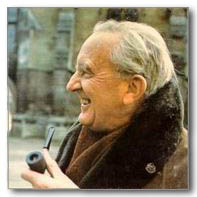As you may know, I consider J.R.R. Tolkien’s The Lord of the Rings to be the literary masterpiece of the twentieth century. I’m not sure how many times I’ve read it, but I generally re-read it every few years. I loved Peter Jackson’s movies but even they don’t hold a candle to the books.
It’s interesting, no matter how many times you read something, you still can find new treasures. I found this gem of foreshadowing recently:
‘I did not mean the danger that we all share,’ said Frodo. ‘I mean a danger to yourself alone. You swore a promise by what you call the Precious. Remember that! It will hold you to it; but it will seek a way to twist it to your own undoing. Already you are being twisted. You revealed yourself to me just now
, foolishly. Give it back to Smeagol you said. Do not say that again! Do not let that thought grow in you! You will never get it back. But the desire of it may betray you to a bitter end. You will never get it back. In the last need, Smeagol, I should put on the Precious; and the Precious mastered you long ago. If I, wearing it, were to command you, you would obey, even if it were to leap from a precipice or to cast yourself into the fire. And such would be my command. So have a care Smeagol!’
– The Two Towers
Emphasis mine.
Never saw that before.

 I first read The Hobbit when I was about ten years old, and I was enthralled. I remember being overjoyed to discover that he had written “more about Hobbits” in another, longer work – a trilogy – called The Lord of the Rings, which I read when I was around eleven or twelve.
I first read The Hobbit when I was about ten years old, and I was enthralled. I remember being overjoyed to discover that he had written “more about Hobbits” in another, longer work – a trilogy – called The Lord of the Rings, which I read when I was around eleven or twelve.